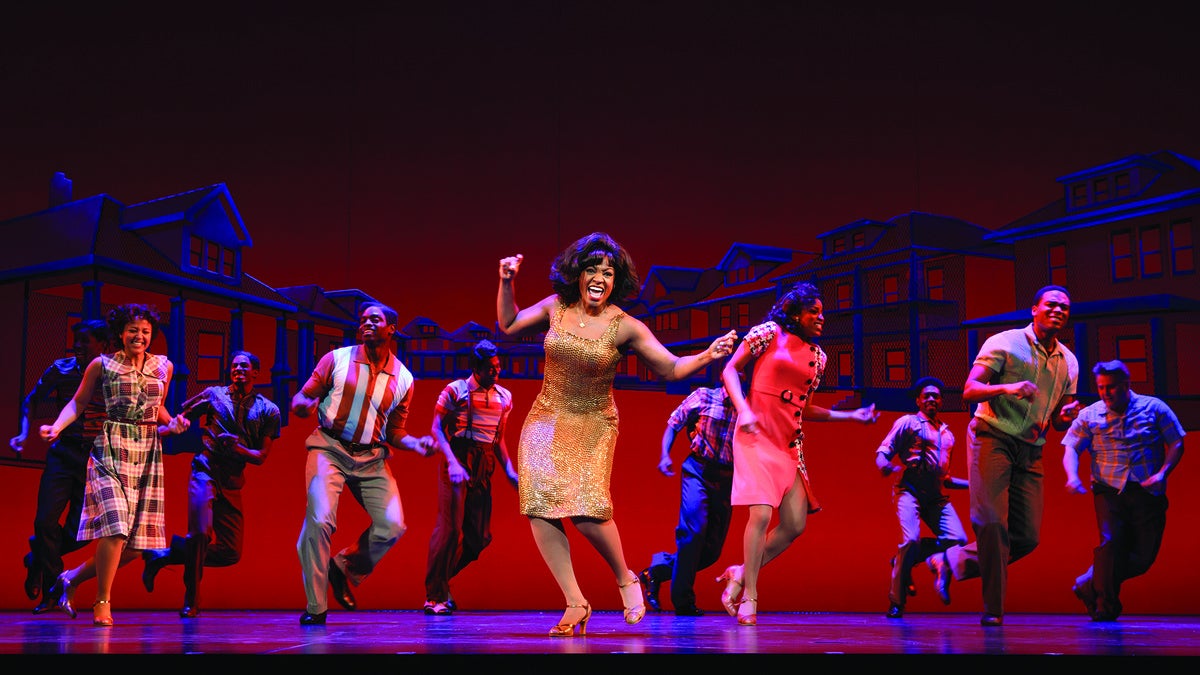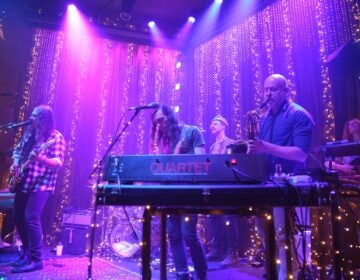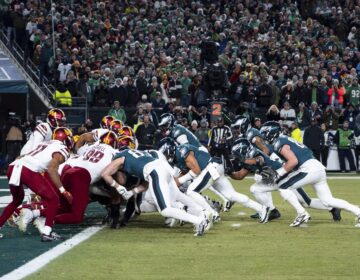Review: ‘Motown: The Musical,’ with A and B sides
Listen
Patrice Covington, in gold outfit, as Martha Reeves (from Martha and the Vandellas) in 'Motown: The Musical' at the Academy of Music. (Photo courtesy of Joan Marcus)
Nobody can tell a good story about Berry Gordy Jr. better than Berry Gordy Jr. And the bad ones? Well, some of them are even in “Motown: The Musical,” or at least Gordy alludes to them. Gordy founded Motown Records, and blazed a path that put black singers and musicians out front in American culture, while for a time crowning his native Detroit as America’s hit-producing capitol.
He also wrote the book for “Motown: The Musical,” a self-portrait that – like Gordy’s Motown singles – has its A sides and B sides. On the A side: The national tour, now at the Academy of Music (while the show still plays on Broadway) is awash in talent and song, with colorful costumes by the single-named Esosa and choreography by Patricia Wilcox and Warren Adams that plumbs the peak Motown era of the ’60s and ’70s. The B side: The show is musically over-packed – more than 60 songs, mostly performed in snippets and sometimes begging for fuller numbers. After a time, “Motown” begins to have the feel of a highly polished talent show – out comes one group covering the Supremes, out comes another, as the Temptations. By the time the young Jackson 5 are introduced with little Michael, the phrase “and then she wrote” could be the show’s subtitle.
But hey, let’s not deny Gordy his ultimate jukebox musical, for the hits he oversaw (more than 110 Top-10 Billboard chart-busters over just 10 years, and more after that) can fill the classiest jukebox. Unlike “Jersey Boys,” that other rags-to-riches pop culture show, the plot of “Motown” takes a back seat to the singing. And when you turn to Page 8 of the program book at the Academy of Music, you instantly see why. (Can someone please get “Stop In the Name of Love” out of my head? I need to make room for “Baby I Need Your Lovin.'”)
The story that ties all this together is, as you would suspect, highly complimentary to Gordy, who controls its telling as he controlled just about everything at Motown, including many of his artists. This was not a bad thing, generally, because he has an uncanny talent for finding uncanny talent – and all along, he had the determination to succeed again big corporations and big media in a business with more than its share of sharks and racists.
The show’s main tension is within Gordy himself: Will he go to the hugely ballyhooed concert being planned to celebrate the 25th anniversary of Motown Records, full of lost loves (Diana Ross chief among them) and formerly trusted colleagues, plus squabbling artists and singing groups that had left over the years for higher-paying contracts? They’re all trying to honor the indelible mark Motown has made, but they’re ostensibly honoring him, too. Will he shun them? Will love – which has the changing value of a stock-exchange commodity in the script of this show – save the day?
The Side-B part of all this: The show never gives us enough material about Berry’s growing discomfort with the past to make us care whether he shows up or not in the present. (I won’t give the answer away here.) In fact, there was a 25th-anniversary Motown concert, recorded on March 25, 1983, and broadcast later on NBC. Diana Ross reunited (awkwardly, off-stage stories tell us) with the Supremes for the evening and an otherworldly, androgynous Michael Jackson awed the audience and viewers with his debut of the song “Billie Jean” and his moonwalk, to boot. (See that legendary performance here.)
If you go to “Motown,” you’re unlikely to see just what I saw Wednesday night because the actress who normally plays Diana Ross on the tour, Allison Semmes, was ill. She was replaced by a cast member who usually takes other roles, Trisha Jeffrey, who did a fabulous job – and made the character seem real. This did not happen on Broadway at the show’s beginning, when I saw it with other Broadway critics; we witnessed a wispy figure who seemed more like the ghost of Diana Ross whenever she spoke. Jeffrey’s Ross, by contrast, is a woman who knows just what she’s about.
Likewise, Julius Thomas 3d is the sort of Berry Gordy we love – dependable, a solid decision maker, and also a workaholic whose ends almost always overcome whatever arguable means he takes to achieve them. He and Jeffrey have powerful and nuanced voices in song – along with the wonderfully personable Jesse Nager, who lights up the stage whenever he appears in the persona of Smokey Robinson.
Jarran Muse is an excellent Marvin Gaye and the rest of the cast, under Charles Randolph-Wright’s spunky direction, is equally convincing as Stevie Wonder, Mary Wilson, the Temptations, the Four Tops, Martha and the Vandellas and … lots, lots more. To borrow from Motown Records, they really get a hold on you.
“Motown: The Musical” runs through Jan. 18 at the Academy of Music, Broad Street between Walnut and Locust Streets. 215-731-3333 or kimmelcenter.org/broadway.
WHYY is your source for fact-based, in-depth journalism and information. As a nonprofit organization, we rely on financial support from readers like you. Please give today.




